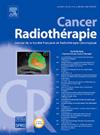放射治疗在原发性肾细胞癌治疗中的作用:来自法国放射肿瘤学会(SFRO)的建议
IF 1.4
4区 医学
Q4 ONCOLOGY
引用次数: 0
摘要
肾细胞癌是世界上第14位最常见的肿瘤,但其发病率正在增加,部分原因是偶然诊断。因此,这些肿瘤在年龄越来越大的患者中被诊断出来,这些患者往往身体虚弱并伴有合并症。大多数肾细胞癌病例为透明细胞癌(80%),乳头状肿瘤是第二常见的组织学亚型。局部肾细胞癌的标准治疗是手术,T1和T2肿瘤分别推荐部分肾切除术或根治性肾切除术。在过去的十年中,针对不适合手术和/或肾功能受损的患者开发了热消融策略。在小的低级别肾细胞癌的情况下,主动监测仍然是一种选择。最近的研究评估了立体定向消融体放疗作为一种耐受性良好且有效的治疗小肾肿瘤的方法,主要用于T1a和T1b肿瘤的治疗。本文旨在报道法国放射肿瘤学学会(SFRO)关于放射治疗在局部肾细胞癌治疗中的作用的建议。这些指南描述了治疗计划方式、目标量和随访程序。他们还关注放射治疗对肾功能的影响,以及需要实施的具体剂量限制。本文章由计算机程序翻译,如有差异,请以英文原文为准。
Role of radiotherapy in the management of primary renal cell carcinoma: Recommendations from the Société française de radiothérapie oncologique (SFRO, the French society for radiation oncology)
Renal cell carcinoma represents the 14th most frequent tumour worldwide, but its incidence is increasing partly due to incidental diagnoses. As a result, these tumours are diagnosed in patients at an increasingly advanced age, often frail and with comorbidities. Most renal cell carcinoma cases are clear cell carcinoma (80 %), with papillary tumours being the second most frequent histological subtype. The standard of care for localized RCC is surgery, with partial nephrectomy or radical nephrectomy being recommended for T1 and T2 tumours, respectively. Thermoablative strategies have been developed over the past decade for patients who are not amenable to surgery and/or with impaired renal function. Active surveillance remains an alternative in the case of small low-grade renal cell carcinoma. Recent research has evaluated stereotactic ablative body radiotherapy as a well-tolerated and effective treatment for small renal tumours essentially for the management of both T1a and T1b tumours. This article aims to report the recommendations of the Société française de radiothérapie oncologique (SFRO, the French society for radiation oncology) on the role of radiotherapy in the management of localized renal cell carcinoma. These guidelines describe both treatment planning modalities, target volumes, and follow-up procedures. They also focus on the impact of radiotherapy on renal function, and the specific dosimetric constraints to be implemented.
求助全文
通过发布文献求助,成功后即可免费获取论文全文。
去求助
来源期刊

Cancer Radiotherapie
医学-核医学
CiteScore
2.20
自引率
23.10%
发文量
129
审稿时长
63 days
期刊介绍:
Cancer/radiothérapie se veut d''abord et avant tout un organe francophone de publication des travaux de recherche en radiothérapie. La revue a pour objectif de diffuser les informations majeures sur les travaux de recherche en cancérologie et tout ce qui touche de près ou de loin au traitement du cancer par les radiations : technologie, radiophysique, radiobiologie et radiothérapie clinique.
 求助内容:
求助内容: 应助结果提醒方式:
应助结果提醒方式:


